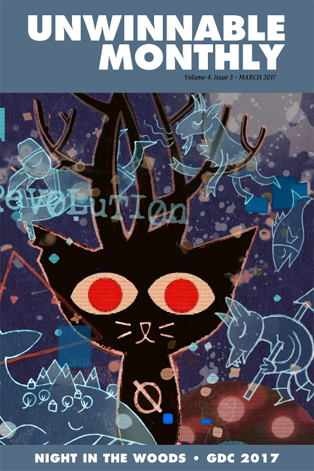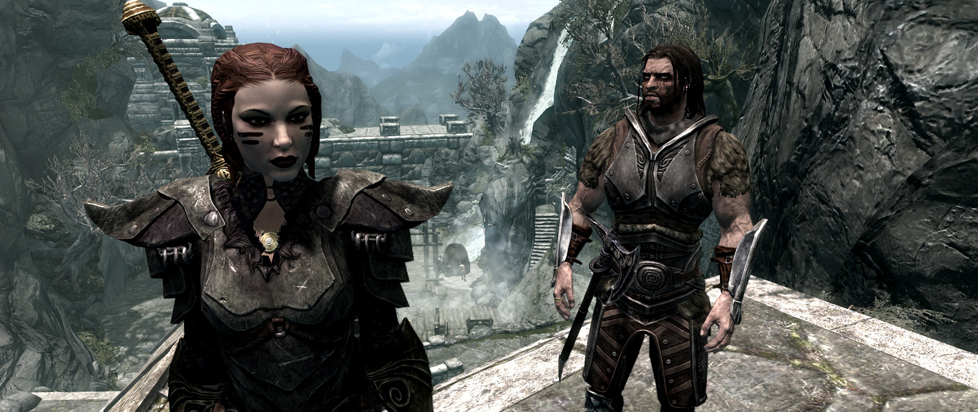
Intimacy & Interpretation
 Gavin Craig has a lot of games on his shelf that he’s never played. Backlog is his attempt to correct that.
Gavin Craig has a lot of games on his shelf that he’s never played. Backlog is his attempt to correct that.
———
This column is a reprint from Unwinnable Monthly #89. If you like what you see, grab the magazine for less than ten dollars, or subscribe and get all future magazines for half price.
———
The Beginner’s Guide starts with a gesture of remarkable intimacy. The game’s creator, Davey Wreden, introduces himself through a voiceover and states that he is going to take the player through a series of games created by a friend of his who uses the name Coda. Wreden says that he encountered these games at a time in his life when he was struggling with some personal issues and that they helped him find direction in his own work.
As might be expected from the creator of The Stanley Parable, there are almost immediately a number of disjunctions between the games Wreden presents and the interpretations he seems to want to make. Frequently, Wreden describes with confidence Coda’s artistic intentions and moments of biographical importance within Coda’s games, despite the fact that Wreden states he didn’t know Coda during the creation of the earliest games and that Coda steadfastly refused to offer any insights into his creative process when he shared the games with Wreden. In fact, the apparent central project of The Beginner’s Guide – that is, presenting a set of games to an audience as a coherent body of work in order to offer insights on an unappreciated creator – seems to be at odds with Coda’s own preferences for his games, most of which are kept in his computer’s recycling bin, ironically labeled “Important Games Folder.”
Coda, as described by Wreden, is a withdrawn individual who creates games that are personal and unconventional to the point of being indifferent to the player. One presents the player with a staircase, but slows movement to a crawl as the player approaches the top. Another places the player in a prison cell for an hour before opening the door and allowing her to exit again. Several games return to the motifs of barred walls and expressions of isolation and creative exhaustion. Wreden assists the player through Coda’s games, restoring normal movement to allow the player to reach the top of the staircase, revealing the solutions to puzzles and otherwise facilitating the player’s ability to navigate through Coda’s unconventional spaces.
Eventually, The Beginner’s Guide makes explicit the subtext of its narrator’s activities. Wreden is not just disregarding Coda’s intentions, he is breaking Coda’s games. The Beginner’s Guide is the story of an act of betrayal and desecration by a narrator who is suggested to have projected his own insecurities and inadequacies onto an acquaintance and fellow game designer.
As a game critic, the critique of interpretation in The Beginner’s Guide is clear, but I’m just as interested in the frustrated desire for intimacy that narrator enacts. “Wreden,” of course, is a self-fictionalization by the game’s creator. Coda’s games are Wreden’s own, either created for The Beginner’s Guide or drawn from his own Important Games Folder. If we are drawn into Wreden’s fiction, however, it is at least in part because of our own desire for the sort of intimacy Wreden’s narrator claims to have with Coda. The animating fiction behind The Beginner’s Guide is the imagination of an unmediated relationship between a game’s creator and the player, an intimacy unsullied by commerce or misunderstanding.
If there is a warning built into The Beginner’s Guide, it is not just for critics. Wreden as the narrator/critic may embody the worst possibilities of interpretation, making an intervention into a body of work not to seek understanding or accessibility but to appropriate the act of creation. Even so, it seems just as accurate to describe (at least initially) Wreden’s project within The Beginner’s Guide not as that of a critic, but of a fan. As much as telling the player what Coda’s work means, Wreden simply wants to put it into the player’s hands. Here, try this, he says. This part is hard, but I can get you past it. Just keep playing. Stick with it. I promise it’s worth it.
When Coda ends his friendship with Wreden in his final game, he doesn’t only complain that Wreden’s interpretations have been intrusive and inaccurate, he asserts that Wreden was never the intended audience for his games at all. That is, he doesn’t just question Wreden’s legitimacy as a critic, he makes clear that he has no standing as a fan. Intimacy on both levels is illusory.
Art is not ours, until, of course, we bring it within ourselves and it is irrevocably changed. This is an act of incredible intimacy and appropriation. The creator touches and escapes us. We are always wrong, and it is beautiful anyway.
———
Gavin Craig is a writer and critic who lives outside of Washington, D.C. Follow him on Twitter @CraigGav




